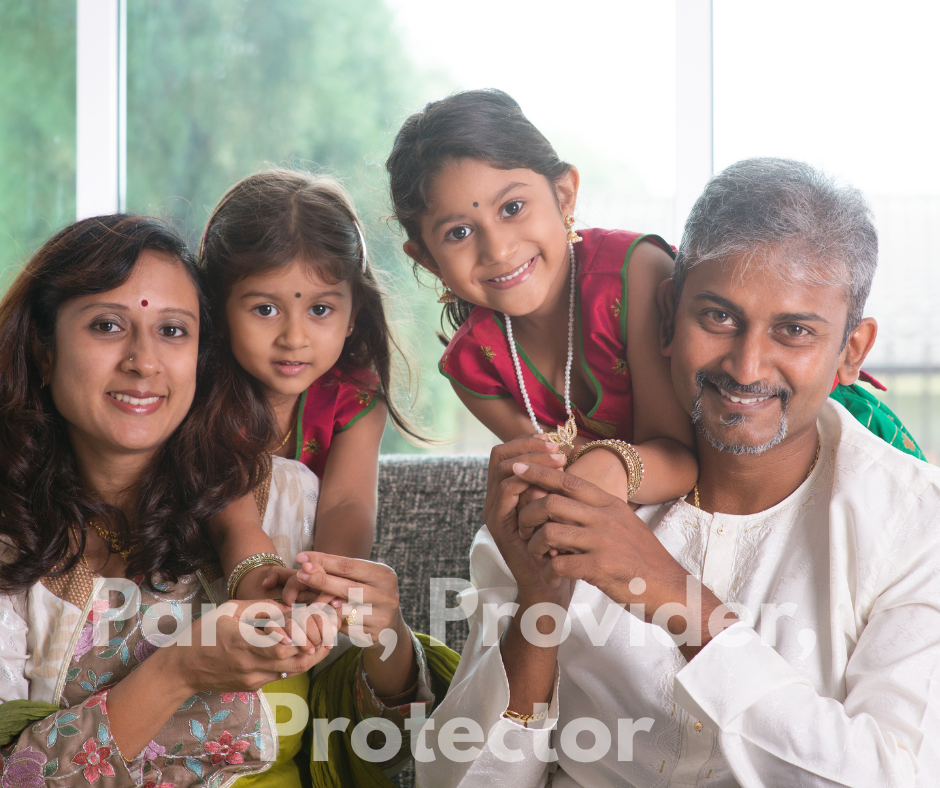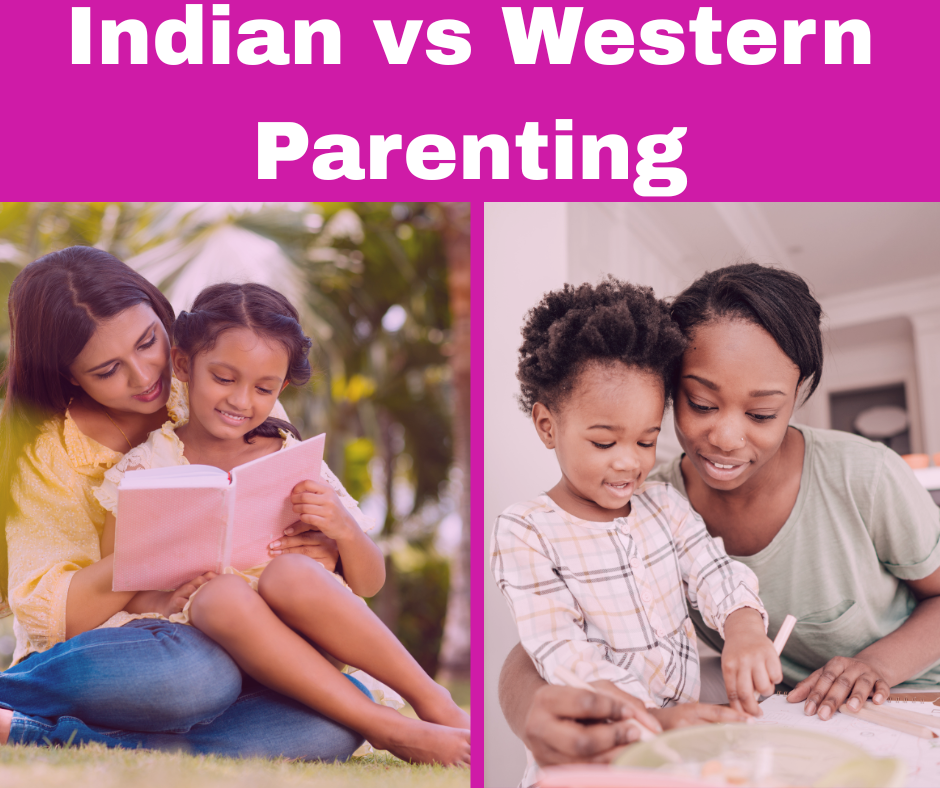Are You Pondering Which Parenting Style is Best for Your Child?
1. Should parenting be strict or flexible?
2. Do responsible adults grow from disciplined children, or does it stink all originality?
3. Why do Indian parents worry about schoolwork all day, and Westerners insist on independence?
4. Which way will make your child more successful and happier?
Many have pondered these questions, and you are certainly not alone. However, parenting patterns can significantly affect a child’s future. To understand the difference between Indian and Western parenting, parents need to arm themselves with knowledge so that they’re well-equipped to make light work of their decisions.
So, let us examine the primary differences, benefits and difficulties of each manifested style.

Parenting is one of the largest influences on child growth. There are many parenting styles around the world, including India and the West. Parenting theories differ by culture and can profoundly shape the values, aspirations, and behavior of children in a particular society.
Indian Parenting often involves strict discipline. The family keeps close watch over kids, tightly regulating their behavior and shaping thoughts so they never venture off track for even an instant. Indian children are truly brought up by their parents.
Western Parenting tends to lay stress on independence, open communication and emotional well-being
This article explores the major differences, advantages/disadvantages, psychological impact of doing it one way versus another (plus, more importantly, who gets hurt if things head south); and whether holding either approach has been shown to bring about results for modern parents and their kids at all.

Major Distinctions Between Indian and Western Parenting
1. Discipline & Authority
✅ Indian Parents: Emphasize respect, obedience, and strict discipline. Rules and customs are to be followed unquestioningly.
✅ Western Parents: Open communication. Children can express their views, and it is up to you as a parent, along with the other members of their family or community—even strangers on the street—to make sure they understand any changes in plans.
Example:
Children in an Indian household should avoid questioning their elders’ decisions. Western parents, however, would see this as a healthy expression rather than disrespect. According to research from the Journal of Cross-Cultural Psychology, kids raised in an environment where communication is encouraged often possess high degrees of critical thinking ability but may struggle when confronted by authority in tightly structured settings.
1. Education & Employment Expectations
✅ Indian Parents: Face education as a chance for success. Medicine, engineering, and law stand out as the top career choices.
✅ Western Parents: Whole child development. A child’s creativity, sports, and personal passions are all as important as education.
Example:
In general, an Indian student will be encouraged to take more math and science classes, while a Western one might have the freedom to try out something different like art, music, or starting their own company A survey last year found that 72% of Indian parents believe good grades are essential for success while only 39% from the West thought academic performance mattered; this is a difference between focusing on personal development and emotional intelligence vs.
3. Structure of the Family & Independence
✅ Indian Families: Family togetherness is a mainstay; parents often decide important things in their kids’ lives, such as what school they’ll go to and who they’ll marry.
✅ Western Families: Independence. Children are often pushed out at 18 to live on their own.
Example:
Many Indian adults will stay living with their parents even after marriage, while Western grownups are expected to have established households of their own. Studies have shown that kids growing up in joint families have a strong emotional support network but might struggle with making decisions by themselves.
4. Punishment and Encouragement
✅ Indian Parents: Belief in strict discipline to teach a sense of responsibility and respect.
✅ Western Parents: With positive reinforcement, good behavior is rewarded instead of punishing bad conduct.
Example:
An Indian parent might ground a child failing classes, while a Western one would encourage improvement by giving extra help and incentives. Studies suggest that using positive reinforcement leads to higher self-esteem and motivation in kids, but a lack of strict discipline could breed a sense of entitlement.

Pros and Cons of Indian Parenting
✅ Pros:
Strong family values and emotional support
Encourages hard work and discipline
Clear expectations for behavior and responsibility
❌ Cons:
High academic pressure can lead to stress
Less emphasis on emotional expression and individuality
Strict rules may limit independent thinking
The Impact of Indian Parenting on Children’s Psychological & Social Development
Indian Parenting & Mental Health: Pressure is Not Always Good
Sometimes the emphasis Indian parents place on discipline and academics creates high pressure levels, inducing mental illness and low self-esteem. Studies have found that 56% of Indian students feel anxious because of their schoolwork.
Confidence vs Obedience: Self-Esteem Compromised
In Western upbringings, children are encouraged to express themselves, hence promoting self-confidence. In contrast, if the upbringing is Indian or, most of all, Chinese, then compliance may be valued over thinking for oneself.
Western Parenting and Creativity: Does Freedom Create Innovation?
In visual arts, we know that ancient Asians produced masterpieces that are appreciated by the world today, but if they were like their modern offspring in their indoctrination, then Hsüntze would be no more Chinese than Charpentier is French. Studies show that students from a Western educational background perform better when required to think independently.

What parenting style is better?
Can Indian Parents Find a Balanced Way of Doing Things?
A blend of Indian discipline and Western encouragement has the potential to provide warmth and structured order.
Combining Indian and Western values
Modern Parents, who may be considered pioneers in this area, bridge the gap between the two cultures while completely setting up mohawk guards at their mansions.
Which is more important to a child’s development: culture, love or discipline?
At the heart of parenting lies a simple truth — love and understanding are more important than any number of strict rules.
Parenting is not black or white, but different strokes for different folks. Indian parenting grows up with discipline and respect, while Western parenting fosters creativity and confidence. The right way may ultimately be centered on both freedom and constraint, as well as independence within limits.
FAQ:
1. What differentiates Indian and Western parenting?
Indian parenting emphasizes discipline, academic excellence, and family involvement. Western parenting, by contrast, cherishes freedom, creativity, and, of course, the physical and emotional health of children. Both have different impacts on child development because they reflect their relevant cultural values.
2. Can such a mix of parenting styles be useful to a child?
Absolutely. A balanced approach can be very helpful. It helps kids grow into confident and responsible adults who are emotionally strong from the inside out. Such an approach requires regulation but no stifling rules; it reflects consideration for the whole person.
3. Why is it that Indian parents seem to make career decisions for their children more often than Western parents do?
Indian culture attaches great importance to stability in its own and others’ societal reputation. Parents often think that it is necessary to guide career paths so that their children have a secure future. However, this approach may, in fact, impede the child’s sincere love for learning and sense of direction.
4. So how do Western parents keep order without being strict?
Western parenting often uses positive reinforcement, such as having kids suffer the natural consequences of their actions and open discussion. It aims to teach rather than penalize, which helps children think through and carry out their responsibility for what’s gone wrong and what’s right.
5. Is Indian parenting undergoing change in these modern times?
Yes. Nowadays, many Indian parents are raising their kids more openly, encouraging them to participate in more extracurricular activities and even to inherit the conventional careers that exist in India.
6. What are the psychological consequences of placing too great an academic burden on a child?
Excessive academic pressure can result in anxiety and depression. It can too lead to low self-esteem and a decline in creativity because the student is too tied up to allow for creativity in his work and unwilling to risk learning life
7. Do Western children honor their parents as much as Indian children do theirs?
Respect in Western parenting is often mutual, and it must be earned through open lines of communication. It is not the same as in an Indian home, but such a kind of respect is also present between equals.
8. How Can the Indian parent impart independence to keep control over children?
By allowing decision-making a little bit at a time and also drawing out yet withholding support, Indian parents can bring up independent children who still maintain familial unity.
9. Is emotional intelligence more emphasized in Western parenting?
Generally, yes. Western parenting promotes emotional awareness and expression, as well as empathy. It also leads to the cultivation of phenomenological emotions, six of which may be discursive, verbalized, and marching towards acting out what has been previously concealed inside oneself.
10. What is today’s best way to be a good parent worldwide?
A hybrid style incorporating both rules and rewards, emotional support and praise for effort, and respect for the individual works best. As the world gets smaller, being a global citizen means accepting other countries’ cultures as well as your own — this means it can’t hurt to give our national children such treatment too!
